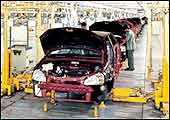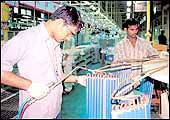|
|
| The
highroad to riches: The Mumbai-Pune
expressway throws open the state's hinterland to would-be investors |
Good evening ladies and gentlemen,
It is indeed a privilege to be with you here today in Mumbai. Ten
days ago, this city experienced, again, very, very unfortunate attacks
by unknown persons, and bomb blasts. Indeed, the first were about
a 100 metres away from where we are now. But I decided to come,
to be here, because business has to go on, just as life has to go
on.... The Mumbaikar has my admiration.
Gerard Kleisterlee, President
& CEO, Royal Philips Electronics
September 4, 2003
The
capacity of Mumbai to shrug off the blanket of fear and terror,
and to ignore the putrid stench of blood and gore, as if they were
routine metropolitan irritants, has taken the form of an almost
worn-out cliché. But this hackneyed truism of "life
must go on" will always be relied on simply because the city
keeps doing exactly that, one terrorist attack after the other.
But as Kleisterlee alluded at his presentation (on the Digital Divide)
to captains of Mumbai industry last fortnight, life goes on in Mumbai
because business has to go on. Or if you're just a cog in Mumbai's
wheel of commerce, you'd prefer to believe that business goes on
because you go on.
| FACT SHEET |
 AREA:
308,000 sq km AREA:
308,000 sq km
POPULATION: 96.7 million
STATE DOMESTIC PRODUCT: Rs 2,41,877 crore
PER CAPITA INCOME: Rs 24,736
ROADS: 2,22,600 kms
POWER (TOTAL GENERATION): 15,148 MW
MAJOR INDUSTRIES: Infotech, engineering, automobiles, chemicals
and fertilisers, pharma, automobiles, electricals and electronics. |
That's why a day after the routine kneejerk
bout of fear and rumour in the wake of the two bomb blasts at the
Gateway of India and the bustling Zaveri Market in Mumbai's innards
on August 25, you could have been forgiven for wondering whether
the terror acts were just a bad dream. The local trains were once
again bursting at the seams, rush-hour traffic was at its snarling
best, and anything money could buy-including body and soul-was once
again available on every city street and its corner.
Now, as far as size goes, Mumbai may be just
an innocuous appendage for map makers of Maharastra, but it's the
lynchpin around which most of the state's-and indeed the country's-business
revolves. All roads literally lead to Mumbai. That explains why
Maharashtra tops the charts on the infrastructure front. It also
explains why raw materials and skilled labour are available in plenty
in this state. "What Mumbai does for this state compensates
for what politicians don't," quips Arun Firodia, Chairman of
the Pune-based Kinetic group.
INTERVIEW/SUSHIL KUMAR
SHINDE
"Maharashtra Will Soon Be 60% Urbanised" |
 |
| Maharashtra CM Sushil Kumar Shinde:
Infrastructure is his #1 priority |
For the past six months Sushil
Kumar Shinde, Chief Minister of Maharashtra, has had
his hands full, sorting out the fiscal mess. His other priority
is to beef up the state's infrastructure. Can he do all that?
Excerpts from an exclusve interview with BT.
Mr. Shinde, what is your reaction
to Maharashtra being ranked No. 1 by BT?
This only reflects the confidence that people have
had in our six-month old government. We have assured the Centre
that we will adhere to fiscal discipline. Besides, we have
undertaken reforms.
But Andhra Pradesh and Karnataka
are fast catching up...
We have also given concessions to information technology
and IT-enabled industries. We are developing Mumbai-Pune-Nashik
as the golden triangle for it. We are also marketing ourselves
aggressively. A nodal agency has been put in place in MIDC
and a high-ranking official has been nominated to liaise between
investors and the government. When our team recently went
to America to attract FDI, we hired a nodal agency to liaise
(with investors). This time, we involved embassies. Recently,
Azim Premji, Chairman of Wipro, sent me a letter appreciating
the promptness shown by my industry secretary.
What about law and order and security?
What I can tell you with confidence is that extortion and
gang wars have reduced substantially. Bomb blasts are due
to terrorism and terrorism can't be dealt with by a state
alone. The Centre, state and people have to fight it out together.
We have succeeded in investigating and solving the August
25, 2003, bomb blasts.
Maharashtra's finances are in a
mess...
The World Bank has appreciated our efforts, especially our
reforms process. We have already achieved 20 per cent savings
on salary-related accounts through a ban on recruitments,
redeployment of surplus staff and voluntary retirement schemes.
We have laid restrictions on expenditure. But despite a
cut in expenditure, development activities and plans have
not stopped.
What's the next stop for Maharashtra?
We are encouraging public-private partnership in infrastructure.
The government has outlined its policy for private sector
partnership in infrastructure. We would be putting a law in
place shortly. It's called the Maharashtra Infrastructure
Development Support Act or MIDAS. It looks at the policy framework
and seeks to support private sector investment. Through this
law, we would create a single-window clearance for infrastructure
projects. We may also privatise the Mumbai-Pune expressway.
Townships may be owned privately. Maharashtra is already 48
per cent urbanised. Soon, we want to take this to 60 per cent.
|
Of course, sometimes it's what politicians do
that takes the sheen off the strides made by the state, as the infamous
Enron saga (a project that was goldplated to keep the powers that
be happy), and similar dubious business-political liaisons of the
recent past prove. In the past, politicians have displayed little
will to market Maharashtra; that resulted in several high-profile
investors ignoring the state for greener pastures. In the mid-nineties,
for instance, Ford Motor toyed with putting up a plant in Maharashtra,
but finally decided on Tamil Nadu.
Shinde Bounces Back
But as BT's survey reveals, Maharashtra has
done well to bounce back to top dog status. Chief Minister Sushil
Kumar Shinde is over the moon, and he can't hide it. "The No.
1 position only reflects the confidence the people have in our eight-month-old
government," says the cm, in typical political-speak (See "Maharashtra
Will Soon Be 60 Per Cent Urbanised"). Slightly more helpful
than that soundbyte is the sheet the cm hands over, which places
Maharashtra at the top in terms of total investments, foreign direct
investment (FDI) and the rate of implementation.
There's also a mention in the sheet of the World
Bank and the Confederation of Indian Industry's Competitiveness
of Indian Manufacturing (2000-01), which ranks Maharashtra the best.
Then, there's a survey by the Federation of Indian Chambers of Commerce
and Industry on FDI, which ranks the state-if you haven't guessed
by now- No 1.
To be sure, right from the time economic reforms
began in 1991, Maharashtra has been hot property, attracting close
to 20 per cent of all investment into the country since then. It's
also generated almost a fifth of all jobs. And there's little sign
of any let-up. According to government-provided information, 14
major projects have been proposed, including a Rs 750-crore passenger
car unit by Skoda Auto, a 1.5 million capacity consumer durables
plant by LG Electronics, a Rs 500-crore expansion by Indo Rama,
a biotech park, 14 private it parks in and around Mumbai and Pune,
and, for good measure, a wine institute.
The reason why companies are hot-footing it
to Maharashtra is straightforward. "Everybody wants to be near
the market," says Firodia. Proximity to vendors, coupled with
a large market translates into cost savings for manufacturers on
the logistics front. Huge volumes mean fatter margins. LG Electronics
found the market size, business environment and infrastructure conducive
for business and that's why it zeroed in on Maharashtra (See Why
LG Chose Maharashtra).
 |
 |
| A veritable powerhouse: Tatas
Motors' Indica plant in Pune and the booming wine trade in Nashik
are just two indicators of the state's rising prosperity |
Not Just Mumbai
Pune, the next big market after Mumbai, has
transformed into an infotech city. That there are 26 engineering
colleges in and around Pune and an estimated 1 lakh engineers helps.
What also helps is the state government's new it and it Enabled
Services policy, which puts down the roadmap for the industry. That's
been enough incentive for Infosys to buy up 100 acres of land in
Pune. It now has 125 acres of land in the city, home to its infotech
park. Now the company plans to invest Rs 250 crore in this facility,
which would house 5,000 software professionals. The Pune centre
employs 2,200 people and generated a revenue of Rs 380 crore last
year. "Thirty per cent of the software professionals in India
are from Mumbai and Pune," says Satish M. Josh, Senior Vice
President, Patni Computers. In a bid to ease the pressure on Mumbai,
Shinde talks about developing a triangle between Mumbai, Pune and
Nashik. The idea is to move most manufacturing out of Mumbai to
Navi Mumbai, Thane and beyond and reserve the city for services
such as banking, entertainment and information technology.
|
|
|
"What
Mumbai does for this state more than compensates for what politicians
don't"
Arun Firodia, Chairman, Kinetic Group |
The state's
it and ITEs policy has succeeded in attracting a host of tech
biggies such as Infosys
S. Gopalakrishnan, COO & Deputy MD, Infosys Technologies |
Growing Discontent
Talk is one thing; concrete action, quite another.
Industrialists in this neck of the woods have their gripes, security
being one of the major ones in the wake of the recent bomb blasts.
Last fortnight, heavyweights like Anand Mahindra, Rahul Bajaj and
Deepak Parekh met Shinde and expressed their concern. There is also
a feeling that the government is not doing enough to better the
infrastructure. "Earlier, agencies like Maharashtra Industrial
Development Corp (MIDC) and State Industrial Corporation of Maharashtra
were more focused," says Kewal Handa, Executive Director (Finance),
Pfizer. Handa, who was also part of the team that met the cm on
August 26, says that the government has made no effort to remove
the Urban Land Ceiling Act. "There is no agency to focus on
creating more jobs," he adds. MIDC Chairman Vidyadhar Kanade
obviously disagrees. "I think Maharashtra is marketing itself
well and continues to have a tremendous headway over other states."
The billion-dollar question, of course, is for how long?
WHY LG CHOSE MAHARASHTRA
On most criteria, the state scored first. |
 |
| LG's Greater Noida plant: The upcoming
Ranjangaon plant will save the company Rs 100 crore on
logistics alone |
It's the market, stupid. It's as
simple as that. With almost every state government bending over
backwards to woo investors, there's little to differentiate
in terms of sops being doled out by Maharashtra to LG Electronics.
After shortlisting four states for its second plant-being set
up at a cost of Rs 500 crore to make 1.5 million microwave ovens,
air conditioners, refrigerators and TV sets-LG chose Maharashtra
(Ranjangaon, just outside Pune) over Andhra Pradesh, Tamil Nadu
and Karnataka. On various criteria, Maharashtra topped the charts,
including business environment, proximity to ports and logistics
savings. But the clincher was market penetration, which is highest
in Maharashtra for LG products. Over 14 per cent of LG's sales
come from this state.
Proximity to the coast will ensure tremendous savings, too.
LG currently exports out of its Greater Noida plant in UP.
Once the Maharashtra plant gets going-by November 2004-it
will save Rs 100 crore annually on logistics alone. "The
cost saving itself would payback the Rs 500 crore investment,"
says S.N. Rai, GM, Corporate Logistics, LG India.
LG considered political instability too before making a
decision. There would have been many states that scored high
on this parameter-at least higher than UP, where LG has been
doing business so far. But then if you have the right product
in the right market, governments won't make a difference,
despite their sincerest efforts.
|
|
